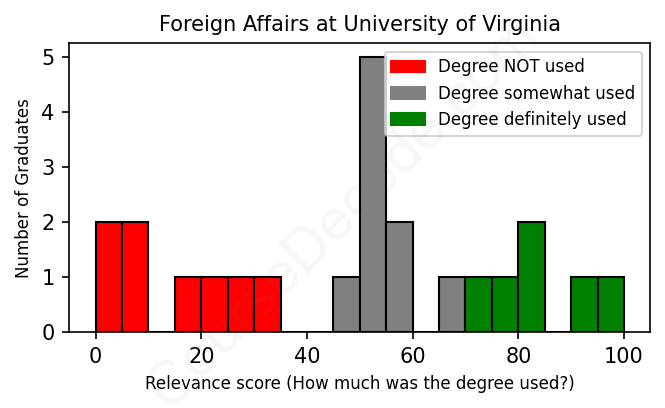
First, some facts. Of the Foreign Affairs graduates from University of Virginia we've analyzed , here's how many have used (or NOT used) their degree in their career:

These are estimates based on AI analysis of 23 LinkedIn profiles (see below).
The verdict? Significantly below average. Overall, with an average relevance score of 47%, Foreign Affairs graduates from University of Virginia have a much lower likelihood (-20%) of finding work in this field compared to the average graduate across all fields:
And for comparison, here's the chart for all profiles we've looked at across all degrees.
Also, after graduating, 39% of these graduates have pursued further education other than another Bachelor's degree (such as a Masters degree or other), compared to the average across all profiles of 35%. This suggests you may need more than just a Bachelors degree to be competitive as a Foreign Affairs graduate.
See the details:
|
Relevance score: 100% We think this person has gone into a career highly relevant to their degree. We think this person has gone into a career highly relevant to their degree.
DEGREE INFOGraduated in 2013 from University of Virginia with a Bachelor of Arts (B.A.) in Foreign Affairs. Also pursued further education since (see below). JOB HISTORY SINCE GRADUATIONConsultant at the Department of Legal Cooperation Organization of American States Jun 2013 - Sep 2014 Staff Member  Organization of American States Sep 2014 - 2016 Project Officer  Organization of American States 2016 - Present FURTHER DEGREES DONE SINCE GRADUATINGMaster of Arts (M.A.)Georgetown University 2017 - 2019 ABOUTA problem solver that has leadership experience tackling complex cybersecurity issues. A vocal promoter of security best practices across international borders.Working as a Project Officer for the Cybercrime Program at the Organization of American States. Feel free to reach out if you think we should connect. |
The top 10 most common jobs done by the graduates we've analyzed (ranked most common to least) are:
After analyzing the job paths of individuals with a degree in Foreign Affairs from the University of Virginia, it seems there's quite a mix in terms of relevance to the field. Many graduates, especially those who pursued roles within government agencies, think tanks, or international organizations, found positions that closely relate to their studies. For example, jobs like Program Assistant at the International Monetary Fund and Research Specialist in Safety and Security at CNA Corporation are excellent examples of how they’ve applied their foreign affairs skills in real-world settings. These roles often engage directly with issues like international relations, policy analysis, and global security—precisely the kind of stuff one might expect to deal with when studying Foreign Affairs.
However, a notable number of graduates ended up in positions that have little to do with Foreign Affairs, such as various roles in local government or in the private sector that focus on business development, administration, or even sales. Many jobs, like being a manager at a ski resort or a software engineer, surprisingly don’t pull from the skills learned in the degree program. This indicates that while some of these graduates find relevant opportunities, a significant portion might use their education in less direct ways, perhaps relying more on general skills they developed during their studies rather than specific knowledge of foreign relations or policy. So, if you're considering a degree in Foreign Affairs at UVA, it's great for certain pathways, but be prepared for a variety of outcomes that might not always align perfectly with those international diplomacy dreams you may have!
Here is a visual representation of the most common words in job titles for Foreign Affairs graduates (this is across all Foreign Affairs graduates we've analyzed, not just those who went to University of Virginia):

When you look at the career paths of graduates from the University of Virginia with a degree in Foreign Affairs, it’s pretty interesting. Right after graduation, many of them tend to land roles in government or non-profit sectors. For example, some started off as specialists or analysts at various government offices, while others took on roles in organizations like the International Monetary Fund or the Organization of American States. This suggests that a lot of these grads are keen on diving into public service or international relations straight out of school, which is a great way to leverage their education. However, there are also quite a few who seem to have wandered off the traditional path, taking on jobs in marketing, sales, or even tech, which might not align directly with their Foreign Affairs background.
Fast forward five to ten years, and it appears many graduates have progressed within their respective fields. A significant number seem to have maintained their connection to Foreign Affairs, moving into higher-level positions within government agencies or related non-profits. For instance, those who started as consultants or analysts have often moved up to become managers or senior specialists. However, there’s a mix of outcomes—some grads have ventured into entirely different areas, like technology or health services, indicating that the skills gained in a Foreign Affairs program can be quite transferable. Overall, it looks like a good portion of these graduates have found fulfilling careers, but the range of career paths shows that some have opted out of traditional Foreign Affairs roles for something that might have seemed more appealing or accessible in the moment. It’s definitely a mix, but the degree clearly opens doors, whether in the Foreign Affairs field or beyond.
Honestly, a Bachelor’s degree in Foreign Affairs at the University of Virginia can be pretty challenging, but it also depends on your interests and strengths. It's not the easiest route out there, as it involves a lot of reading, critical thinking, and understanding of complex global issues. You’re going to dive deep into subjects like international relations, political theory, and economics, which can be heavy stuff if you're not super into them. But if you’re passionate about global affairs and enjoy engaging with different cultures and perspectives, it might feel more manageable and even enjoyable. Just be prepared to stay on top of your assignments and discussions, because this program can be quite rigorous compared to some other majors!
Most commonly, in the LinkedIn profiles we've looked at, it takes people 4 years to finish a Bachelor degree in Foreign Affairs.
Looking at these UVA grads, it seems like the money situation varies a lot depending on their career paths and how far along they are. A lot of them started in roles that might not pay super well, especially those in government or entry-level positions. For example, the first grad who spent years in local government probably didn't rake in the big bucks, but they moved up to a management position, which often pays better. On the flip side, those who ended up in tech or consulting, like the ones working at Capgemini or Deloitte, are likely pulling in healthier salaries right off the bat. Overall, it looks like some have found decent financial stability, especially those in higher-level positions or in sectors like tech, but others might be on more modest incomes starting out. So, it's a mixed bag!
Here is a visual representation of the most common words seen in the "about" section of LinkedIn profiles who have a Bachelor degree in Foreign Affairs (this is across all Foreign Affairs graduates we've analyzed, not just those who went to University of Virginia). This may or may not be useful:

Here are all colleges offering a Bachelor degree in Foreign Affairs (ordered by the average relevance score of their Foreign Affairs graduates, best to worst) where we have analyzed at least 10 of their graduates:
| College | Score | Count |
|---|---|---|
 University of Virginia University of Virginia
|
47 | 23 |